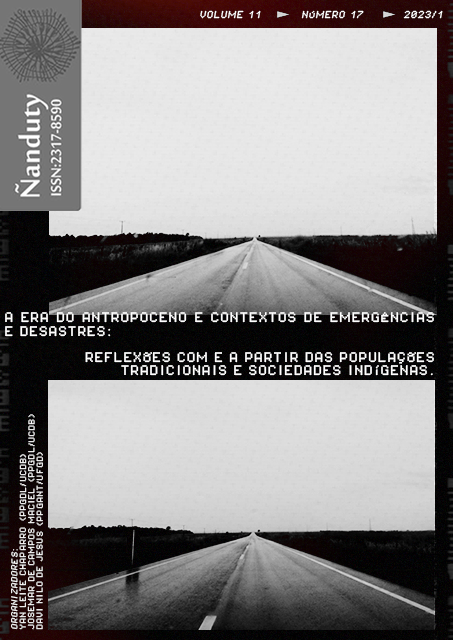A Queda do Céu: ensinamentos da cosmoecologia Yanomami
DOI:
https://doi.org/10.30612/nty.v11i17.16787Palavras-chave:
Cosmoecologia, Yanomami, AntopocenoResumo
Neste artigo, busca-se apresentar os resultados de uma pesquisa de iniciação científica, onde foi estudado sobre os ensinamentos que a cosmoecologia dos Yanomami poderiam trazer no contexto contemporâneo do Antropoceno, denominação atual da nova era geológica cuja atuação antrópica tem impacto planetário. Procura-se destacar, na cosmologia Yanomami, quais aspectos que remetem à compreensão de sua relação com as categorias humanidade/mundo, com destaque para a noção de humanidade estendida e de mundos plurais. A cosmoecologia configura-se na relação dos seres com o meio ambiente, a partir da interpretação da narrativa cosmológica. A seguir, é apresentada uma contra-antropologia, nas considerações do líder e xamã Davi Kopenawa acerca do “povo da mercadoria”. Ainda neste tópico, discorre-se sobre a polissemia do termo matihi na cultura yanomami, que vai desde objetos de troca, mercadorias, à objetos ritualísticos e por fim, também fornecem a chave de compreensão do princípio das trocas e socialidade deste povo, com ênfase no desapego e na generosidade. O terceiro e último tópico apresenta o mito escatológico yanomami que fala da queda do céu, interpretando-o também como um alerta frente à destruição da floresta amazônica e a degradação ambiental causada pelo desmatamento para diversos fins e pelo garimpo ilegal, causando danos irreversíveis à saúde dos Yanomami e ao equilíbrio deste imenso bioma. Por fim, busca-se extrair os ensinamentos de cada aspecto discorrido, como possibilidades e aberturas à modos outros de ser e estar no planeta comum denominado Terra, com vistas à preservação e cuidado a todas as formas de existência.
Downloads
Referências
ALBERT, Bruce. 1992. A Fumaça do Metal: História e Representações do Contato entre os Yanomami. Anuário Antropológico, Rio de Janeiro: 89: 151-189. In: https://periodicos.unb.br/index.php/anuarioantropologico/article/view/6434. (acessado em out/22).
ALBERT, Bruce. 2002. O ouro canibal e a queda do céu: uma crítica xamânica da economia política da natureza (Yanomami)”. In : ALBERT, B. (ed.); RAMOS, R.C. (ed.). Pacificando o branco: cosmologias do contato no norte-Amazônico. São Paulo, UNESP, p. 239-274.
ALENCAR, Claudia Rodrigues. 2016. “O “tempo do fim” de Günther Anders”. AnaLógos, Rio de Janeiro, 1: 105-115. In. https://www.maxwell.vrac.puc-rio.br/28223/28223. (acessado em 30 de dezembro de 2022).
BORGES, Luiz, C. 2004. “Cosmologia e sagrado na produção do saber Guarani”. Revista da SBHC, Rio de Janeiro, jul./dez., 2(2):120-132.
CARTA DE SEATTLE. 1855. Trad. equipe de Floresta Brasil. In: http://www.ecoterrabrasil.com.br. (acessado em 24 de dezembro de 2022).
CHAKRABARTY, Dipesh. 2009. “The climate of history: four thesis”. Critial Inquiry, 35: 97-222.
DANOWSKI, Déborah; VIVEIROS DE CASTRO, Eduardo. 2014. Há mundo por vir? Ensaio sobre os medos e os fins. Florianópolis, Instituto Socioambiental.
DELANDA, Manuel. 2002. Intensive Science and Virtual Philosophy. Londres, Continuum.
DESCOLA, Philippe. 2013. Más Allá de Naturaleza y Cultura. Buenos Aires, Amorrortu.
ELIADE, Mirceas. 2019. O mito do Eterno Retorno. Portugal, Edições 70, 2019.
FOUCAULT, Michel. [1966] 1981. As palavras e as coisas: Uma arqueologia das ciências humanas; trad. Salma Tannus Muchail. São Paulo, Martins Fontes.
GOMES, Ana Maria Rabelo; KOPENAWA, Davi. 2015. “O Cosmo segundo os Yanomami: Hutukara e Urihi”. Rev. UFMG, Belo Horizonte, jan./dez., 22 (1) E 2: 142-159.
JENSEN, Casper Bruun. 2004. “A Nonhumanist Disposition: On Performativity, Practical Ontology, and Intervention”. Configurations, (12): 229-61.
INGOLD, Tim. 1994. Humanity and Animality. Companion Encyclopedia of Antrophology. Londres, Routeledge.
KOPENAWA, Davi; ALBERT, Bruce. 2015. A Queda do Céu: palavras de um xamã Yano-mami. Trad. Beatriz Perrone-Moisés. São Paulo, Companhia das Letras.
LADEIRA, Maria Inês. 2007. O caminhar sob a luz: território Mbya à beira do oceano. São Paulo, Unesp.
LATOUR, Bruno. Diante de Gaia: oito conferências sobre a natureza do Antropoceno. 2020. Trad. Maryalua Meyer. S.P./R.J., Ubu Editora/Ateliê de Humanidades Editorial.
LATOUR, Bruno. Reagregando o social: uma introdução à Teoria doAtor-Rede. 2012. Trad. Gilson César Cardoso de Sousa. Salvador/Bauru, Edufba/Edusc.
LIMA, Tânia Stolze. 1996. “O dois e seu múltiplo: reflexões sobre o perspectivismo em uma
cosmologia Tupi”. Mana, Rio de Janeiro, out., 2 (2): 21-47.
LOVELOCK, James. [1972] 1987. Gaia: um novo olhar sobre a vida na Terra. Lisboa, Edições 70.
MARX, Karl. [1867] 2011. O capital: crícita da economia política. Tradução Rubens Enderle, São Paulo, Boitempo, v.1.
STENGERS, Isabelle. 2015. No tempo das catástrofes. São Paulo, Cosac & Naify.
TOLEDO, Túlio. 2020. “Perspectivismo ameríndio e Natureza”. Sacrilegens. Juiz de Fora, jul./dez., 17( 2): 33-46.
VERNANT, Jean-Pierre. 1973. Mito e Pensamento entre os Gregos. São Paulo, Difusão Europeia/EDUSP.
VIVEIROS DE CASTRO, Eduardo. 2018. Metafísicas canibais: Elementos para uma antropologia pós-estrutural. São Paulo: UBU Editora.
VIVEIROS DE CASTRO, Eduardo. 1996. “Os pronomes cosmológicos e o perspectivismo ameríndio”. Mana. Rio de Janeiro, out., 2 (2): 115-144.
VIVEIROS DE CASTRO, Eduardo. 2006. “A floresta de cristal: notas sobre a ontologia dos espíritos amazônicos”. Cadernos de Campo. São Paulo, (14/15): 319-338.
VIVEIROS DE CASTRO, Eduardo. 2011. “Desenvolvimento econômico e reenvolvimento cosmopolítico: da necessidade extensiva à suficiência intensiva”. Sopro. Rio de Janeiro, maio, 51: 2-9.
WILBERT, Johannes; SIMONEAU, Karin; ALBERT, Bruce. 1990. Folk literature of the Yanomami Indians. Los Angeles, University of California. UCLA Latin American Center Publications, v. 73.
Downloads
Publicado
Como Citar
Edição
Seção
Licença
Autores que publicam nesta revista concordam com os seguintes termos:
- Autores mantém os direitos autorais e concedem à revista o direito de primeira publicação, com o trabalho simultaneamente licenciado sob a Creative Commons Atribuição-NãoComercial-CompartilhaIgual 3.0 Brasil que permitindo o compartilhamento do trabalho com reconhecimento da autoria do trabalho e publicação inicial nesta revista.
- Autores têm autorização para assumir contratos adicionais separadamente, para distribuição não-exclusiva da versão do trabalho publicada nesta revista (ex.: publicar em repositório institucional ou como capítulo de livro), com reconhecimento de autoria e publicação inicial nesta revista.
- Autores têm permissão e são estimulados a publicar e distribuir seu trabalho online (ex.: em repositórios institucionais ou na sua página pessoal) a qualquer ponto antes ou durante o processo editorial, já que isso pode gerar alterações produtivas, bem como aumentar o impacto e a citação do trabalho publicado (Veja O Efeito do Acesso Livre).


